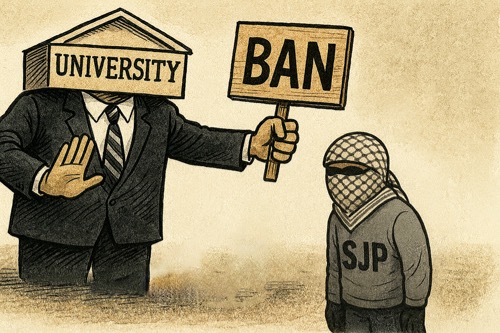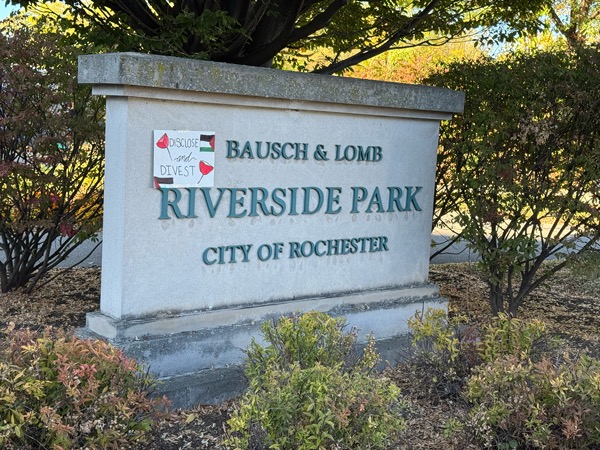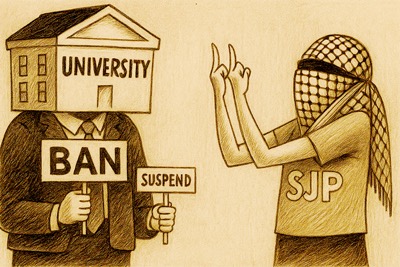
Classes began at most American colleges and universities last week. Will a sense of normalcy return, or will students be forced to endure a third year of double-masked keffiyeh-clad hipsters, shouting "Free Free Palestine" and "From the River to the Sea"? On each campus, it will depend on how the administration deals with its SJP problems.
After years of enduring the anti-Zionist, antisemitic Students for Justice in Palestine (SJP), many administrations decided after October 7 that its toxic campus presence could no longer be tolerated. But SJP will not go away as long as there is a Jewish state, so each school must devise a plan for dealing with its recalcitrant Hamas supporters.
The various approaches to protests, riots, building takeovers, and encampments range from conciliatory to combative, from acquiescing to banning.
Conciliation
As in all campaigns physical and rhetorical, weakness invites aggression. The University of Maryland (UMD) took the weakest, and arguably the worst, approach of all to an SJP problem by settling a lawsuit and agreeing to pay its SJP chapter. The university did not disclose details of the settlement to the suit brought by Palestine Legal and the Council on American Islamic Relations (CAIR). Palestine Legal claimed that the university paid SJP $100,000.
The University announced in a groveling statement that "UMD SJP is a registered student organization in good standing, which has had more than 100 events on campus since Oct. 7, 2023, for which it consistently followed the university's policies and procedures governing such events."
At least the public now knows that calling for the destruction of the world's only Jewish state complies with University of Maryland policy.
Suspensions and Bans
Thankfully, UMD is an outlier. Far more schools decided to suspend their SJP chapters. Adelphi University recently joined their ranks when it announced in August that it had put its SJP chapter "on disciplinary probation for a year." Many other schools had already done so in 2024, among them: Columbia University, George Washington University, Rutgers University, Temple University, Tufts University, Case Western Reserve University, the University of Vermont, the University of Pittsburg, the University of Michigan, the University of Georgia, Brown University, and Swarthmore College.
Some schools specified longer suspension terms. The University of Illinois, Urbana-Champaign banned its SJP chapter for 3 years, and UCLA banned its for 4 years.
The 1-year suspensions issued in the Spring 2024 semester of encampments have expired. We will soon learn what, if anything, they have accomplished. We may also discover the mechanisms for reinstatement. An important question will have to be answered by each administration: what does it mean to be an SJP chapter "in good standing"?
Some schools, not content with temporary suspensions, went for permanent bans. Brandeis University and The University of Pennsylvania permanently banned their SJP chapters. So did Yale University, which called its version of the permanent ban a "de-recognition."
Denial - The Strangest Approach of All
Of all the ways that schools have attempted to address their SJP problems, the University of Rochester in upstate New York has taken the most unique approach – I think it qualifies as quixotic. Contrary to a mountain of evidence, it denies that it has an SJP problem. After I mentioned the university's SJP chapter in an article, the University of Rochester asked me to change what I wrote.
I declined.
Tomorrow, "Addressing Campus SJP Problems, Part 2: Denial at the University of Rochester"
 Chief IPT Political Correspondent A.J. Caschetta is a principal lecturer at the Rochester Institute of Technology and a fellow at Campus Watch, a project of the Middle East Forum where he is also a Milstein fellow.
Chief IPT Political Correspondent A.J. Caschetta is a principal lecturer at the Rochester Institute of Technology and a fellow at Campus Watch, a project of the Middle East Forum where he is also a Milstein fellow.
Copyright © 2025. Investigative Project on Terrorism. All rights reserved.
Articles by the IPT may be re-published as long as full attribution and a link back to the original article is provided. |



 Addressing Campus SJP Problems, Part 2: Denial at the University of Rochester
Addressing Campus SJP Problems, Part 2: Denial at the University of Rochester
 SJP's Hunger Strike Tactics
SJP's Hunger Strike Tactics
 Banning SJP Won't Erase SJP
Banning SJP Won't Erase SJP